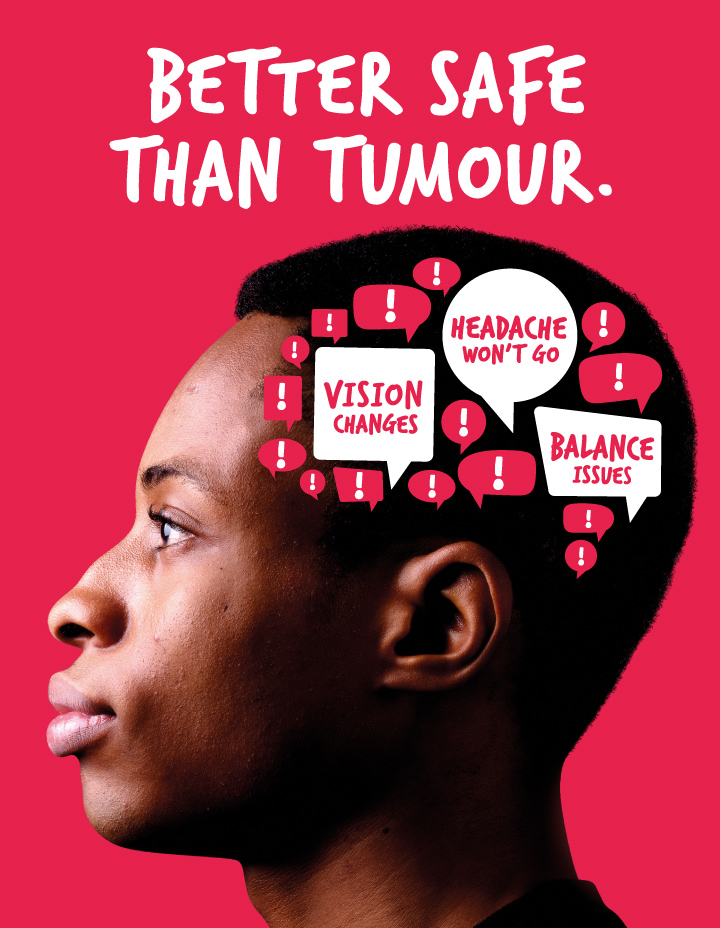Abnormal head position or head tilt in a child
Abnormal head position means a problem with your child’s neck, causing them to hold or move their head in an unusual way. There are a lot of causes for head tilt in a child, but it could be a sign of a brain tumour. If your child has this symptom, it’s important to take them to your GP.

On this page, we’ll discuss:
- What is an abnormal head position?
- What can cause an abnormal head position?
- Could my child’s head tilt be a brain tumour?
- What to do if my child has an abnormal head position?
Other symptoms
Use our Better Safe Than Tumour symptom checker to check for other brain tumour symptoms.
Talking to your doctor
Learn more about how to approach your GP.
Get your free Information Pack
Our Brain Tumour Information Pack can help you better understand your diagnosis and feel confident talking to your medical team.
What is an abnormal head position?
Abnormal head position is the term used when a child’s head isn’t in the normal position. Instead, their head may be tilted up, down, left, or right. Or, their face could be turned right or left. Or, they could have a combination of some of these.
What can cause an abnormal head position?
Abnormal head position can be caused by a number of things. Some of these are:
Visual problems
A head tilt or bad head posture can be caused by a squint, jerky eye movements (called nystagmus), or different vision between the eyes. Droopy eyes can also cause a rear head tilt.
Torticollis or wry neck
Torticollis, or ‘wry neck’, is a musculoskeletal issue that affects the neck. It causes twisting of the neck that causes the head to tilt and rotate, creating an abnormal head position.
It can be caused by a throat infection, which is usually the case with older children up to nine or ten.
In younger children, up to the age of five, it is usually caused by the position that the child was in while in the womb.
A brain tumour
An abnormal head position is one of the symptoms of a brain tumour.
While this can be worrying, it’s important to remember that brain tumours are relatively rare. But, it is still important to consider this if your child has a tilted head, especially if they show other symptoms of a brain tumour.
For more on spotting brain tumour symptoms in children, visit our dedicated site, Better Safe Than Tumour.
Could my child’s head tilt be a brain tumour?
A brain tumour at the back of the head can cause your child to have a stiff neck.
They may develop a head tilt. This is where the child holds their head or neck in an unusual way, such as at an awkward angle or in a twisted position.
Your child may develop wry neck. This is where they have difficulty turning their head from side to side.
What to do if my child has an abnormal head position?
If you notice that your child has problems with their neck or is holding their head at an unusual angle, book an appointment with your GP as soon as possible. Also, if your child is over the age of three you should also book an appointment at your optician to get their eyes checked.
If your child shows one symptom you should book an appointment with your GP as soon as possible. And, if they are experiencing two or more symptoms you should request an urgent referral to a consultant.
If symptoms are severe or occur suddenly, take your child to an emergency department or call 999.
I think my child has a brain tumour, what should I do?
Brain tumours are rare. But, if you’re worried and a symptom persists or if your child has more than one symptom of a brain tumour then:
- Talk to your doctor
GP appointments are usually quite short, so make sure you find out how to best prepare for your child’s appointment. - Get an eye test
If your child’s symptoms are limited to changes in vision and/or headaches, get their eyes tested by an optician before seeing your GP. - Go to A&E
If the symptoms are sudden or severe, you should go to your emergency department or call 999.
In this section

Know the Signs and Symptoms
Although brain tumours are rare, if you or a loved one are experiencing two or more of the signs and symptoms it’s important that you speak to your doctor to rule out a brain tumour.
Share your experiences and help create change
By taking part in our Improving Brain Tumour Care surveys and sharing your experiences, you can help us improve treatment and care for everyone affected by a brain tumour.